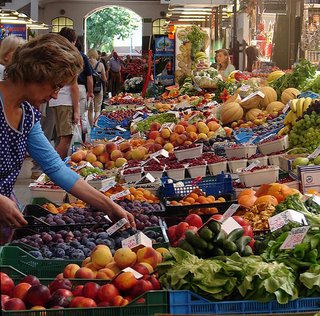"Each peach, pear, plum…"
 Yesterday's frost that hit Tasmanian orchards is only the latest case of climate conditions affecting fruit production in Australia, and I fear it will compound the affects on fruit prices. Never mind the bananas, I reckon we haven't seeen the last of the fruit driven inflation.
Yesterday's frost that hit Tasmanian orchards is only the latest case of climate conditions affecting fruit production in Australia, and I fear it will compound the affects on fruit prices. Never mind the bananas, I reckon we haven't seeen the last of the fruit driven inflation.The ABC reports that "full extent of the damage [in Tasmania] will not be known until later in the week, but early reports suggest severe losses of cherries, apricots and apples."
Previously, there was a frost in Victoria's Goulburn Valley recently that is said to have wiped out swathes of the region's pear and peach crops. I cried at the news, fearing the skyrocketing prices robbing me of the chance to enjoy peaches this summer or have the chance to preserve them in brandy again (yum). And what will I do without pears next autumn? Now it will be the cherries and apples!
With the pressure that global warming is putting on our water stores – yes, we are having the worst drought on record – including water for farming, I think we will see the price of food crop production go up. All the governments are busily handing-out 'drought relief' to farmers hardest hit.
Clive Hamilton of the Australia Institute has criticised the hand-outs as bad policy because they subsidese farmers with poor farm management. He argues that the farmers who can't cope with drought conditions are the ones getting the 'relief', whereas those who are coping by drought-proofing their land and implementing good farming practices are not being supported. He goes as far as saying:
"It's time we just faced up to the reality that much of the land currently farmed, shouldn't be farmed and by repeatedly bailing out farmers through drought relief, which is erroneously called exceptional circumstances relief, we're only making the problem worse."I don't think this makes him a popular man with farmers, or the National-Liberal coalition, I think.
In many ways, he is right. We should be thinking about changing farming practices towards more sustainable, water and land efficient methods that can cope with the impacts of global warming. Organic and sustainable farming is doing great things in that area. As consumers, we should consider directing our dollars to support organic farmers a lot more so that we can reward sustainable farming in ways that the government won't. And we should support their call for more sustainable farming.
It is time to start listenting to the voices in the wilderness.
Update: reports indicate that cherry crops were hardest hit in Tasmania, and pundits expect fruit shortages in this next season. Bye-bye cherry clafoutis. [Updated Friday 20 October, 1.25 pm]
[Image: Market Hall in Wroclaw, Poland, by harbalea]










0 Comments:
Post a Comment
<< Home